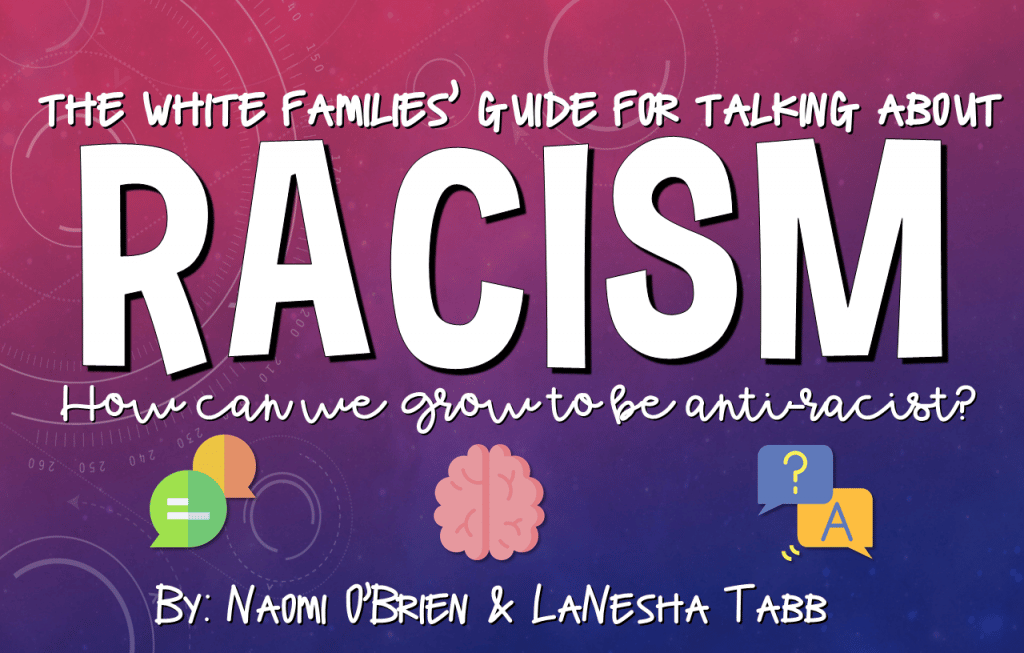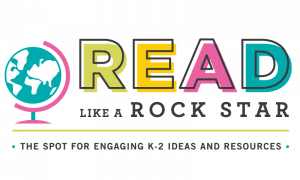
*click ANY image in this post to be taken to the product.
White families, if you’re here, we hope it’s because you’re ready to start having important conversations with your children about racism and actively planning what your family can do to help.
The guide is intended for caregivers to use with their white children. If you have children who are not white, but who are also a part of your family, this guide is not for them. Black, indigenous, and other children of color DO NOT need to be present while you process through how you may have been complicit in racism. This will cause them further harm and trauma.
Look through the entire guide and take notes. Familiarize yourself with the content, so that you can feel prepared to facilitate a conversation. Read up on the definitions and think of simpler terms or analogies you may need to use to help your kids understand. You should also be ready to share times that you personally have seen or taken part in racism. Explain to your kids what happened. You may need to explain what you would change about what you did or the lesson you learned.
Remember this: Your kids are exposed to racism all of the time, whether or not you’ve ever labeled it for them. They see unfair things happening and they hear racist comments. Giving them the tools and vocabulary they need to recognize it and speak up about it will help them feel empowered to be a part of the solution and show a Black friend, stranger, or classmate that they can depend on your child to be an *ally. (See image below for a note on allyship)
When defining racism for your kids, please be sure to talk to them about microaggressions. Some kids (and adults) only think of racism as the really big and violent acts Black people face. It isn’t always easy to spot if you don’t know what all forms of it look like.
We need you to know that you and your kids can do racist things, even if you don’t identify yourself as a racist person. In the same way that a nice person can sometimes do or say mean things that are out of character, so can you or your children when it comes to doing or saying racist things. Now that you’ve committed to being more aware, you may notice things more clearly and be able to call it out every time you see it. And you’ll be able to change your behavior and apologize when you need to.
It may feel weird to tell your kid(s) they’ve done something racist. But it’s helpful to be direct. You aren’t going to yell at them about it, but you will need to remind them that it’s wrong. They will quickly learn to distinguish between what’s just being mean and what’s actually racist. Our own children have similar lessons. We, Black parents, have to teach them to identify racism they are experiencing, so that they can come tell us about it and can learn to advocate for themselves.
Make sure to also tell your kids WHY you all are focusing on being an ally to the Black community. Remind them that, everyone matters, but right now, you are focusing on the Black community and the racism they experience.
It’s important to tie racism into history. You know your child best. If you need to research enslavement, segregation, Jim Crow laws, protests, Juneteenth, white supremacy, and police brutality before engaging with your children so you feel prepared to answer their questions about where racism came from or why people are racist, make sure you do this before you sit down to have a lesson with them. Again, being prepared to have the conversation, will make you feel more comfortable. It will help you explain in your own words why this work is important for your family.
Throughout our guide you will see symbols that serve as visual cues. Sometimes your child will be asked to stop and reflect. Sometimes there will be a question to answer. We encourage caregivers to answer the questions, too. It is helpful for kids to see they are not alone in their feelings, thoughts, or experiences.
There is also a symbol for questions. Don’t forget to stop periodically to see how your child is processing the information. How are they feeling? What are they confused about? What would they like to know? Encourage them to ask! Be mindful of your tone or your facial expressions so that kids are not inadvertently discouraged from sharing honest answers. Remember, anything they’ve learned (from you or elsewhere) can be unlearned.
We made sure to include many exercises and questions that could lead to deeper conversations, but we can’t have the conversations for you. These lessons are only as effective as you allow them to be.
Here are some articles and book links that will help you with this resource:
CLICK THE IMAGE BELOW TO PURCHASE.
We hope you can shift away from thinking these conversations are too hard to have, to realizing these conversations are too important NOT to have.
Best,
LaNesha and Naomi


Because we realize the value of important topics like this, LaNesha and I love to make sure our own students and children are exposed to a variety of much needed social studies lesson. We teach kindergarten and first grade, but our students continue to amaze us with the big ideas they are able to handle!
What are your children learning in school for social studies? How diverse are the books being presented to them at school? It’s important for parents to continue to take an active role in what their students are learning!
You can push for culture nights at your school. Ask what anti-racist work your child’s school engages in. You may also want to ask how important inclusion and diversity is for every classroom in your child’s building.
Together, we can make a difference.
Click here to check out the social studies resources we have created. Consider purchasing a unit for a teacher to use. They are K-2 friendly!



| Cookie | Duration | Description |
|---|---|---|
| cookielawinfo-checkbox-analytics | 11 months | This cookie is set by GDPR Cookie Consent plugin. The cookie is used to store the user consent for the cookies in the category "Analytics". |
| cookielawinfo-checkbox-functional | 11 months | The cookie is set by GDPR cookie consent to record the user consent for the cookies in the category "Functional". |
| cookielawinfo-checkbox-necessary | 11 months | This cookie is set by GDPR Cookie Consent plugin. The cookies is used to store the user consent for the cookies in the category "Necessary". |
| cookielawinfo-checkbox-others | 11 months | This cookie is set by GDPR Cookie Consent plugin. The cookie is used to store the user consent for the cookies in the category "Other. |
| cookielawinfo-checkbox-performance | 11 months | This cookie is set by GDPR Cookie Consent plugin. The cookie is used to store the user consent for the cookies in the category "Performance". |
| viewed_cookie_policy | 11 months | The cookie is set by the GDPR Cookie Consent plugin and is used to store whether or not user has consented to the use of cookies. It does not store any personal data. |
Thank you for your interest in booking a private professional development experience! Please fill out our Booking Inquiry form and a member of our team will contact you soon.